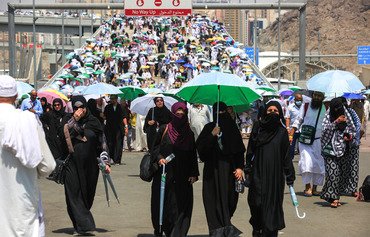More than 20,000 Yemeni pilgrims have left Yemen to perform Hajj despite roadblocks imposed by the Houthis (Ansarallah) along the route.
The joint efforts of the Ministry of Endowments and the Hadramaut Valley local authority have made the pilgrims' passage easier this year.
The local authority oversees the Hajj convoys which pass through al-Wadiah border crossing between Yemen and Saudi Arabia.
The number of Yemeni pilgrims this year stands at 24,500, about 20,000 of whom have already left as of Sunday (August 20th), officials said.
"The last pilgrim should arrive [to Mecca] at the start of the Hijri month of Dhu al-Hijjah, or August 23rd," Mukhtar al-Rabbash, deputy minister of endowments and guidance told Al-Mashareq.
An operations room was set up to follow the tafweej (dispatch) process for the Yemeni pilgrims from their residences in Yemen to their destination, he said.
Overcoming hurdles
On August 12th, Hadramaut province undersecretary for Hadramaut Valley and Desert affairs, Issam al-Kathiri, launched the tafweej process for pilgrims through al-Wadia crossing in Hadramaut.
"The local authority in Hadramaut Valley, which oversees al-Wadiah crossing, has worked to overcome the difficulties and problems that pilgrims encountered last year," he told Al-Mashareq.
In co-operation with generous benefactors, the local authority set up camps for pilgrims at the border crossing, which provide healthcare services, cold water, drinks and food.
Last year, thousands of Yemeni pilgrims were stranded at al-Wadiah for days without access to services.
Al-Kathiri attributed this to the fact that the pilgrims transported by the majority of Hajj agencies arrived to the crossing in one wave, at the same time.
This year however, hajj visas were issued in increments which has allowed for the dispatch of pilgrims over several stages.
"The agencies whose pilgrims were the first to receive their visas immediately started the tafweej process to avoid the mass tafweej of pilgrims that happened last year and resulted in chaos that negatively impacted the hajj season," said Sami Awad, director of al-Hadrami Hajj and Umrah Agency.
Houthis obstruct pilgrims
The first two days of the tafweej process saw some pilgrims, especially those coming from the northern provinces, arrive late to al-Wadiah after the Houthis obstructed their departure, al-Kathiri said.
The Ministry of Endowments on August 13th accused the Houthis of withholding the passports of nearly 2,000 pilgrims and obstructing the travel of others.
"The Houthis confiscated the passports of pilgrims at checkpoints in areas under their control and obstructed the travel of others," the ministry’s undersecretary for Hajj and Umrah Mukhtar al-Rubash said in a statement to local media.
Al-Rubash denounced this act as "unjustified and has no connection whatsoever to religion or ethics", and strictly rejected the politicisation of Hajj.

![Buses are getting ready to transport Yemeni pilgrims to Mecca by land from the capital Sanaa. [Abu Bakr al-Yamani/Al-Mashareq]](/cnmi_am/images/2017/08/21/9280-yemen-hajj-bus-600_384.jpg)







These militias won't succeed with these acts and provocation of the feelings of pilgrims.
Reply1 Comment(s)